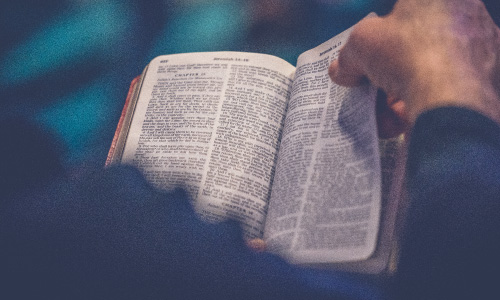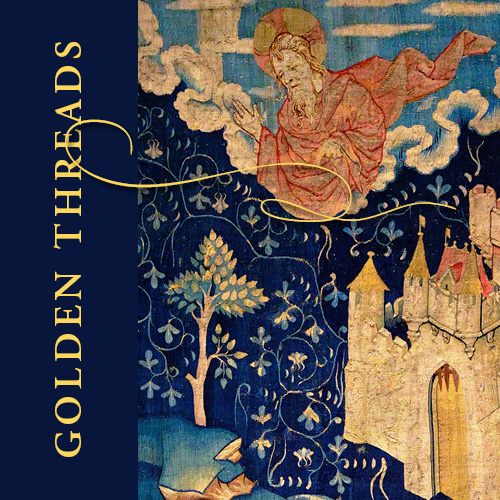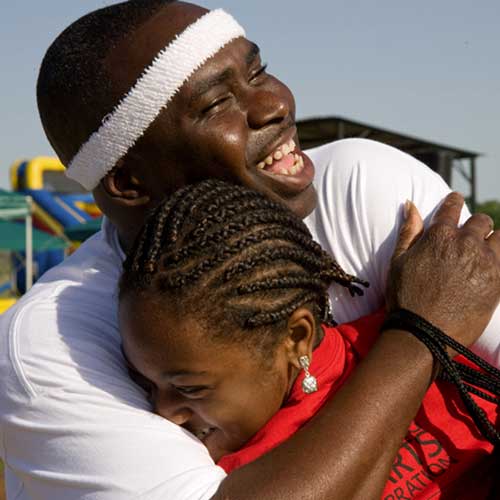Day 29: Fear That Leads to Integrity and Forgiveness
Posted on: April 6, 2025
by: Gerrit Dawson, Senior Pastor
by: Gerrit Dawson, Senior Pastor
WEEK FIVE
FEAR GOD!

Sara Granados. Photograph. www.sara-sees.com.
Phrases involving the fear of the LORD or fearing God occur more than 150 times in the Scriptures from Genesis to Revelation. Yet this idea of fearing God troubles us. Are we supposed to be scared of God all the time? Do we fear divine wrath at our slightest infraction of his laws? Is God out to get us?
Contemplating the fear of God reminds me of the time I visited the Cliffs of Moher in Ireland. This nine-mile line of sheer cliffs rises from 400 to 700 feet above the sea below. Where we stopped, there was no guardrail. As I walked toward the edge, I could see the endless sea out beyond me and far below. I stopped and dropped to continue on my knees, but I could not go on until I army-crawled on my belly. As I peered over the precipice, I laughed out loud in simultaneous fear and delight. I was but a tiny speck that could be blown by a wind into the abyss below. However, in that moment I felt part of something wondrous. The grandeur awoke awe. I love these cliffs. I fear these cliffs. I long to return to them and again give myself to this beauty. But would I dare the edge again?
My experience at the cliffs revealed the more ordinary and constant fear I have of gravity. That doesn’t mean I wake up trembling at the thought of the force that tethers me to the earth. But it does mean I watch my step. I am careful on ladders, and I certainly don’t jump out of the windows in my office. Gravity is real. Necessary. A constant reality for earth dwellers. Fearing gravity means taking it seriously. Being on a cliff’s edge reminds me of how truly awesome is this force.
Similarly, fearing God means to take the reality of God seriously. He is the reference point for everything. We constantly account for the truth that God exists and has a character for us to know and a will for us to follow. I ignore the gravity of God at my peril. He’s not hostile, but, like gravity, he is a real, constant force with which I have to align my life so that I flourish.
As we begin these two weeks, we can describe five activities, all conveniently beginning with “r,” that the healthy Biblical fear of God requires of us.
Refer. In the Bible, someone who belongs to the LORD refers all experiences and choices to God’s reality. When something pleasing occurs, I give thanks to God from whom all blessings flow. When something upsetting occurs, I bow to the sovereignty of God. What seems like chaos is actually not out of his control. Even the abyss of the sea and the reach of the stars are bordered by God’s control. Therefore, my circumstances are under his care as well. When I have moral choices to make, I refer to the revealed character of God. I seek to act according to who God is. Referring to God in all things is a key component of healthy fear.
Respect and Revere. Referring to God leads to respect and reverence. The LORD is God. I am not! The triune God carries out his will for the world over time. He weaves his respect for human choices into the inevitable outcome of his eternal plan. My best life means respecting the way God has made the world, human beings and me in particular. There are both natural and revealed laws of God. When I respect those laws, I align my actions with them and find a better path to flourishing than I could invent. On the Cliffs of Moher, only a fool would dance along the edge heedless of the height, the winds and the reality of gravity. A wise person respects what is greater than us.
Remember. God acted in history to call a people to himself to bless the world through them. Through the centuries, the LORD intervened to save those people from slavery, enemies and exile. We find that the LORD’s prophets repeatedly called the people to remember what God had done for them. To forget what God has done is to rush headlong into life repeating mistakes and missing out on participating in God’s plan and will. A healthy fear of the LORD causes us to recall God’s saving acts, to give thanks for them and to draw upon them for guidance for living now.
Relate. The very point of calling us to fear God is that we might relate to the LORD. “The friendship of the LORD is for those who fear him,” says David in Psalm 25:14. When we know who the true God is, we lose any kind of servile fear. We discover that we are not pawns or playthings for God. He desires to make us his beloved children, and he sent his own Son to be one of us so that we might be taken into intimacy with the Father through Jesus Christ. As Augustine said, “You have made us for yourself, O God, and our heart is restless until it finds rest in you.” (Saint Augustine, The Confessions of Saint Augustine, 1.1.1.). Healthy fear inspires us to relate intimately with God.
Relax and Rejoice. Oswald Chambers writes, “The remarkable thing about fearing God is that when you fear God, you fear nothing else, whereas if you do not fear God you fear everything else.” (Oswald Chambers, My Utmost for His Highest. London: Marshall, Morgan & Scott, 1927, July 8.) When we have a healthy fear of God, we find peace amid everything else. The fear of God means acknowledging his rule and reign. We put our trust in his kingship. But this also means that we don’t have to fear what other lesser forces may do to us. Nature, disease, mortality, autocrats, bureaucrats, dominators, manipulators, and hustlers all lose their threatening power when we know we are in the hands of the sovereign God. Even more, when we fear God we discover we don’t have to create, sustain or fulfill our lives on our own. God gives us meaning and purpose. We can relax and rejoice in the triune God of grace.
As we explore the fear of the LORD this week, we will discover, to our delight, how closely related joyful love for God and the healthy kind of fear are. I am grateful to acknowledge the strong influence Michael Reeves’ book Rejoice and Tremble has shaped my understanding of the healthy fear of God. (Michael Reeves, Rejoice and Tremble: The Surprising Good News of the Fear of the Lord. Wheaton IL: Crossway, 2021.
FEAR THAT LEADS TO INTEGRITY AND FORGIVENESS
Every day, pray aloud worshipfully this golden thread that weaves through the entire tapestry of God’s intent for us.
Behold, the days are coming, declares the LORD,
when I will make a new covenant with the
house of Israel. . . .
I will put my law within them,
and I will write it on their hearts.
And I will be their God, and they shall be my people.
They shall all know me, from the least of them
to the greatest. . . .
For I will forgive their iniquity, and I will
remember their sin no more.
(Jeremiah 31:31, 33-34)
Daily Scripture
Context Note: When he was an arrogant young man, Joseph’s envious brothers sold him to traders who brought him to Egypt as a slave. Through the decades, the LORD caused Joseph to rise to be second only to the Pharaoh over the country. In this scene, Joseph’s brothers have come to Egypt to buy grain during a famine. Joseph recognizes them, but they do not realize that this powerful man in Egyptian attire is their long-lost brother. Although he greatly desires to be reconciled to his brothers, Joseph needs to test them. So Joseph demands that they return to Canaan to bring back their younger brother Benjamin leaving behind another brother as collateral. As they discuss this proposal, the brothers reveal that they feel remorse and guilt over what they did to Joseph years before.
Genesis 42:18-25
On the third day Joseph said to them, “Do this and you will live, for I fear God: if you are honest men, let one of your brothers remain confined where you are in custody, and let the rest go and carry grain for the famine of your households, and bring your youngest brother to me. So your words will be verified, and you shall not die.” And they did so. Then they said to one another, “In truth we are guilty concerning our brother, in that we saw the distress of his soul, when he begged us and we did not listen. That is why this distress has come upon us.”
And Reuben answered them, “Did I not tell you not to sin against the boy? But you did not listen. So now there comes a reckoning for his blood.” They did not know that Joseph understood them, for there was an interpreter between them. Then [Joseph] turned away from them and wept. And he returned to them and spoke to them. And he took Simeon from them and bound him before their eyes. And Joseph gave orders to fill their bags with grain, and to replace every man’s money in his sack, and to give them provisions for the journey. This was done for them.
Picking Up the Thread

Here is the first instance in Scripture of someone saying, “I fear God.” Joseph says this to his brothers as a way of swearing that they can trust his word. What is it about fearing God that gives a person integrity? It’s as if Joseph says, “If I were only relying on my power and position, I might be lying and ready to kill your brother in captivity. But I know I am accountable to a God of steadfast love. In keeping with his character, the LORD requires that I keep faith with you.”
How might Joseph have come to this dignified fear of God? As a cocky boy in a colorful coat, he learned that being a favored son did not exempt him from his brothers’ ire. He experienced how “God opposes the proud” and only years later learned as well that God “gives grace to the humble” (1 Peter 5:5). Serving in the house of the Egyptian officer Potiphar, Joseph kept his faith, worked hard and rose in stature. His healthy fear of God was apparent: “The LORD was with Joseph, and he became a successful man. . . . His master saw that the LORD was with him and that the LORD caused all that he did to succeed in his hands” (Genesis 39:2-4).
However, God’s favor and sovereignty do not necessarily spare us from suffering. In fact, his plan may include our hardships. Joseph maintained his integrity against the seductions of Potiphar’s wife, but he was unjustly accused and then put into jail for years. Even after successfully interpreting a dream for Pharaoh, he remained imprisoned for two more years.
All along, Joseph kept a healthy fear that, on the one hand, God never left him, but, on the other hand, God did not immediately answer every prayer just as Joseph wished. Ultimately, Joseph rose to be Pharaoh's closest advisor. Even with great power, his early trials kept him grounded and kept his heart open to reconciliation with his brothers. Only a man who had feared the LORD all his life could utter the words Joseph said to his brothers, “I am your brother, Joseph, whom you sold into Egypt. And now do not be distressed or angry with yourselves because you sold me here, for God sent me before you to preserve life. For the famine has been in the land these two years, and there are yet five years in which there will be neither plowing nor harvest. And God sent me before you to preserve for you a remnant on earth, and to keep alive for you many survivors. . . . So it was not you who sent me here, but God. . . . As for you, you meant evil against me, but God meant it for good, to bring it about that many people should be kept alive, as they are today.” (Genesis 45:4-8, 50:20).
Stitching It In
The fear of the LORD is awareness that God alone is sovereign, that God is active in our lives and world, and that God can make even the worst that happens to us redemptive for ourselves and others. Only this fear, this radical trust, reverence and constant reference to God, can enable us to process the events of life in this fruitful way. Without fear of the LORD, we may see only the sting of tragedy. With the fear of the LORD, we see his gracious hand in a myriad of ways even in times of struggle or uncertainty. Joseph had every reason to be bitter. He could so easily have taken revenge on his brothers. But when he declared, “I fear God,” he had determined to act with integrity and forgiveness.
The fear of God that Joseph affirmed involves looking beyond ourselves to the higher power and the bigger picture. In particular, we trust in our Creator to make all things right. And we commit ourselves to being part of that rectification especially when it’s hard. We carry on in faith that the triune God rules and reigns.
Praying Along the Pattern
Wise Jesus, you taught us to fear God the right way.
You put the word “Father” on our lips.
You coached us to ask first for the Father’s glory,
For his holiness to be acknowledged
And his will to be done on earth as in heaven.
You lived this radical trust that your Father’s plan
Is truly, despite appearances, the way the world is going.
Evil will not have the last word. You will.
So, in faith, in right fear, I align my will with yours.
May I with Joseph, say in every decision this day,
“I fear God, therefore. . . .”
And so may people know you through me.
May my respect and reverence for your reality,
My healthy fear, reveal your love to the world.
Posted in:
Lent




 Close
Close












